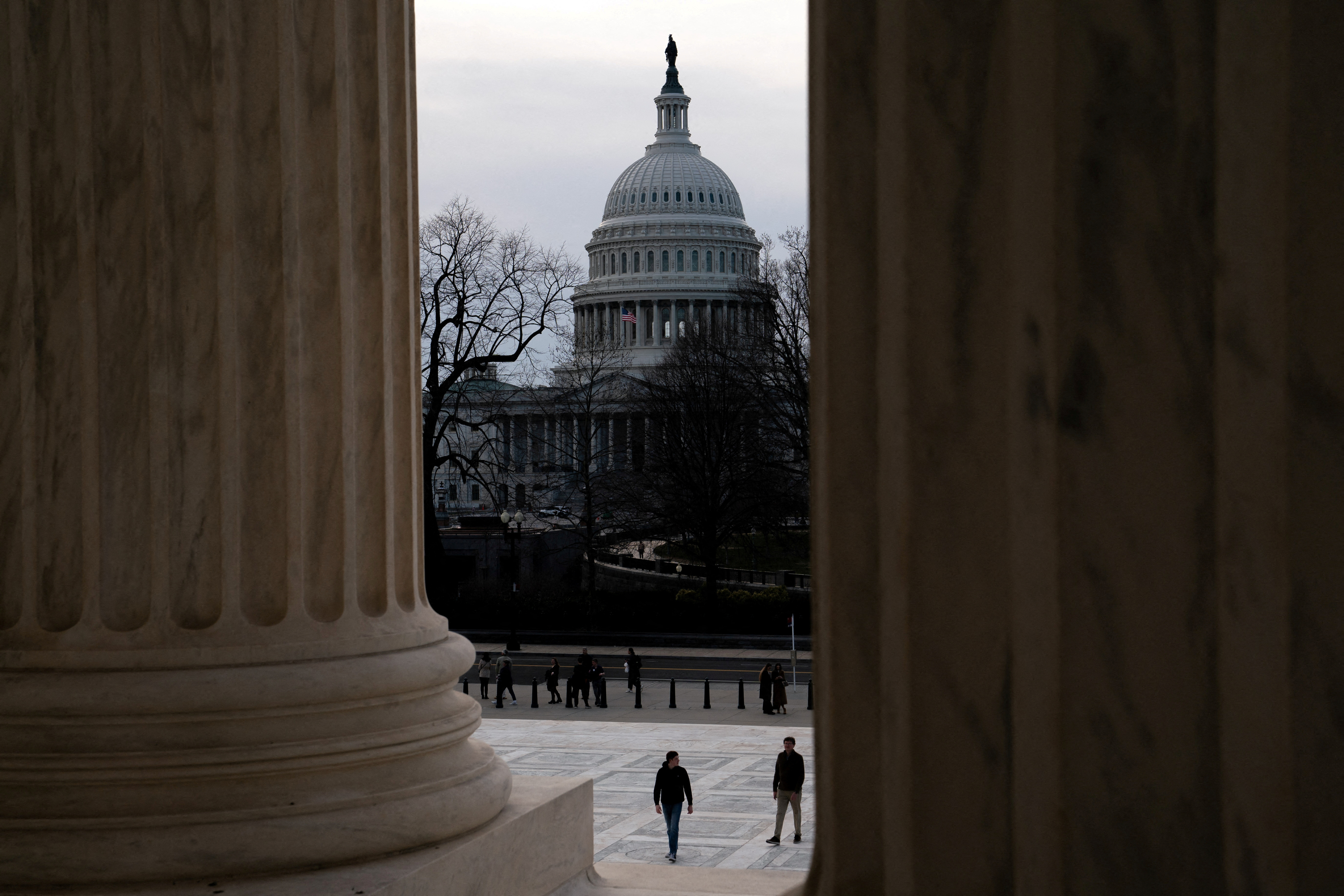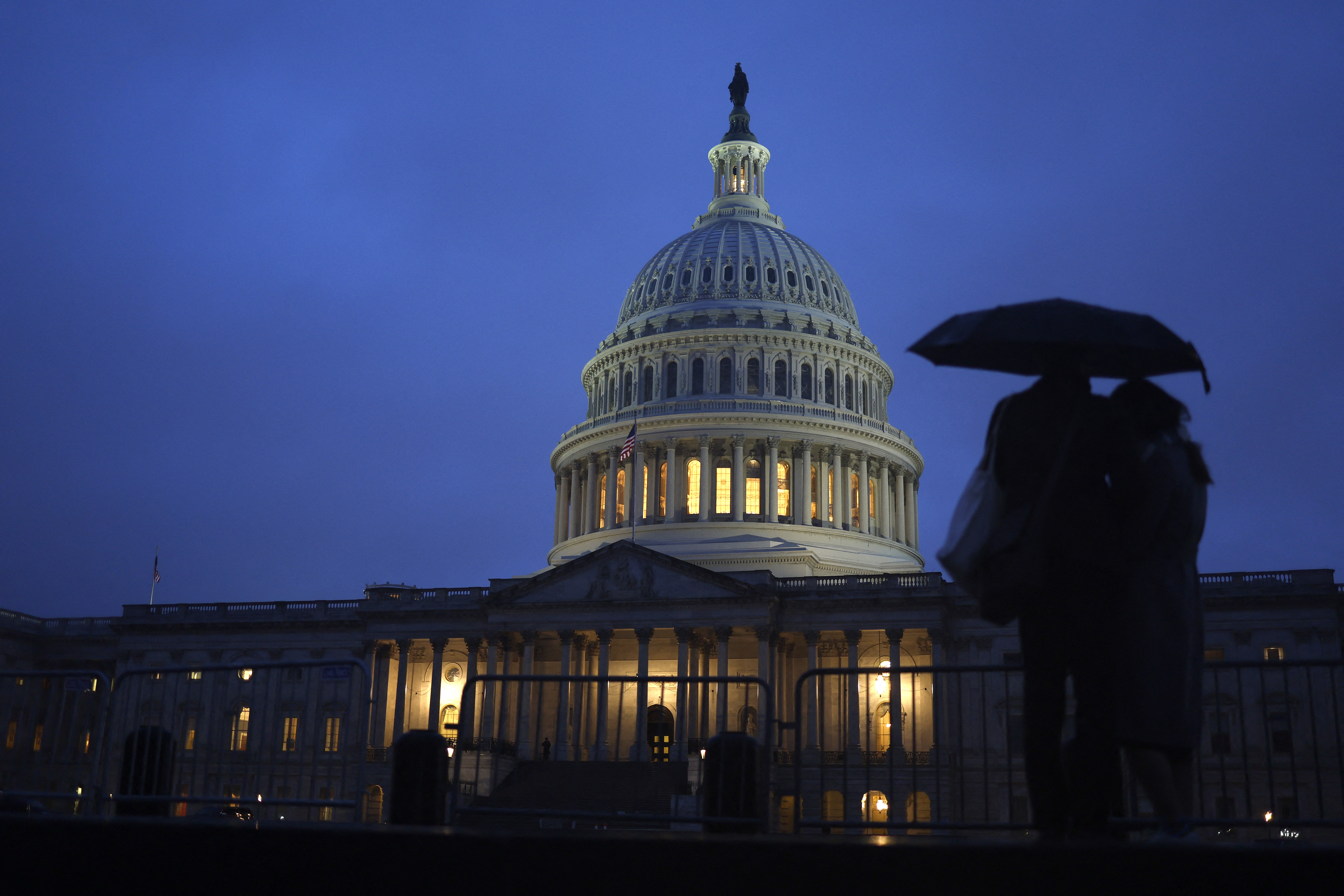
A number of scholars, politicians and advocates have condemned the United States Senate’s passage this week of a foreign funding bill that would provide billions of dollars in military aid to Ukraine, Israel and Taiwan while American social programmes are in need of funding.
It is unclear when – or even if – the House of Representatives will vote on the measure, which includes $9bn in international humanitarian assistance, some of which could go to besieged Palestinians in Gaza.
But in passing the $95bn emergency aid package on Tuesday by a margin of 70 to 29, analysts say the Senate articulated Capitol Hill’s longstanding prioritisation of guns over needs for housing, healthcare, education and debt relief.
Lindsay Koshgarian, programme director of the National Priorities Project at the Institute for Policy Studies, told Al Jazeera that she had “extreme concerns” about the total amount of the Senate legislation.
“At $95bn, it’s a significant increase to the US federal budget and a significant devotion of resources to war,” she said.
“There’s huge discrepancies in where the resources are going.”
Across social media this week, some observers also denounced the foreign aid bill by invoking a lyric from the late rapper Tupac Shakur: “Got money for war, but can’t feed the poor.”
‘Skewed priorities’
The Senate bill (PDF) provides $60bn in military and economic aid to Ukraine and $14.1bn in security assistance to Israel, among other things.
Money for munitions is tantamount to “throwing good money after bad”, according to critics of the legislation. House Speaker Mike Johnson has suggested he won’t allow the aid package to reach the House floor for a vote, as he had demanded immigration reform as part of the legislative package.
Since former President Lyndon B Johnson’s administration in the 1960s escalated the war in Vietnam and derailed the War on Poverty programme, the federal government has increasingly squeezed out social spending while devoting larger and larger proportions of its overall budget to militarised programmes.
According to a May report by the National Priorities Project, 62 percent of the federal discretionary budget – $1.1 trillion – went to these programmes in the 2023 fiscal year.
In contrast, “less than $2 out of every $5 in federal discretionary spending was available to fund investment in people and communities”, including public education, housing, and childcare, among other social programmes.
“We must invest in humanity, both at home and abroad. Congress must stop funneling taxpayer dollars into endless wars and invest in the housing, health, education, and social programs our communities need,” Democratic Congresswoman Cori Bush tweeted on Tuesday after the Senate bill was passed.
We must invest in humanity, both at home and abroad. Congress must stop funneling taxpayer dollars into endless wars and invest in the housing, health, education, and social programs our communities need. pic.twitter.com/3Fdy9cs4Sc
— Congresswoman Cori Bush (@RepCori) February 13, 2024
In particular, the Senate’s decision to funnel more military aid to Israel while it continues to bombard the Gaza Strip has fuelled widespread criticism and raised questions about priorities on Capitol Hill.
“In a situation where the International Court of Justice has said that it’s plausible that a genocide could be occurring [in Gaza], the decision by the Senate to approve sending $14bn in weapons to Israel makes the US more directly complicit,” said Mike Merryman-Lotze, Just Peace Global Policy director at the American Friends Service Committee.
William Hartung, a senior research fellow at the Quincy Institute for Responsible Statecraft and expert on US military budgets, also said that, overall, “even by Washington standards, $95 billion is a lot of money”.
The Senate bill’s passage, Hartung wrote in Forbes on Wednesday, “lays bare the skewed priorities of the federal government”.
“Despite deep divisions, it is possible to get bipartisan support for a package that mostly involves funding weapons exports. Don’t expect any such emergency measure to address record levels of homelessness, or aid the one in six American children living in poverty, or accelerate investments in curbing the climate crisis,” he said.
A jobs boost?
Biden has argued that the bipartisan legislation is critical to US national security interests and sends a clear message that his administration continues to stand by its allies. The bill also will bolster the US economy by creating jobs, according to the president.
“While this bill sends military equipment to Ukraine, it spends the money right here in the United States of America in places like Arizona, where the Patriot missiles are built; and Alabama, where the Javelin missiles are built; and Pennsylvania, Ohio and Texas, where artillery shells are made,” Biden said in a White House address on Tuesday.
“And the way it works is we supply Ukraine with military equipment from our stockpiles, and then we spend our money replenishing those stockpiles so our military has access to them – stockpiles that are made right here in America by American workers,” he said.
“That not only supports American jobs and American communities, it allows us to invest in maintaining and strengthening our own defence manufacturing capacity.”
But research has shown that other types of government spending would do more to boost jobs than what one researcher described (PDF) as Washington’s pattern of “feeding one wolf – the militarized economy – to the detriment of others”.
Heidi Peltier, senior researcher at the Watson Institute for International and Public Affairs at Brown University and programmes director at the Costs of War project, wrote in a June report that military spending supports 6.1 jobs per $1m spent.
By comparison, the report found that healthcare creates 11.6 jobs per $1m – nearly double – while a $1m investment in primary and secondary education creates 21 jobs, more than three times as many. The same investment in wind and solar also would create nine to 14 percent more jobs.
Better uses for $95bn
According to Koshgarian of the Institute for Policy Studies, there are a multitude of ways $95bn could be better used to support Americans, from funding programmes that tackle child poverty and education, to addressing housing affordability issues.
She noted, for example, that a critical federal nutrition programme for women, infants and children – known as WIC – is facing a $1bn funding shortfall. “It’s an incredibly important programme, there are many families that have depended on it,” she said. “$1bn to make up the shortfall would be easy to come up with.”
The US is also falling short of its climate adaptability and green economy goals, Koshgarian told Al Jazeera, and the public is “told consistently that we don’t have the funds to afford those programmes in full”.
Greater investments in programmes like these, she added, will “pay off in multiple ways down the line for people in this country, in a way that investing in wars overseas [doesn’t]”.
“When the US invests in war in another location, it just perpetuates those instabilities, and it’s not a cycle that can end through just investing in militarism over and over again.”

Merryman-Lotze at the American Friends Service Committee also said that $95bn could be better spent on domestic priorities, such as the environment and education.
And if the US really wants to address the root causes of conflicts abroad, it could also do better than spending money on weapons, he added.
“The US approach to conflict and problems is one that is highly militarised, whether that’s the way in which we respond to crime at home through policing and prisons, or we respond to conflict overseas through a reliance on military force,” Merryman-Lotze told Al Jazeera.
“The first thing that we turn to in most instances is the military, the police, violence and guns. That’s the way that our system has been built up over decades, and there’s a need to break away from that addiction to the idea that force is how we bring ourselves security.”







